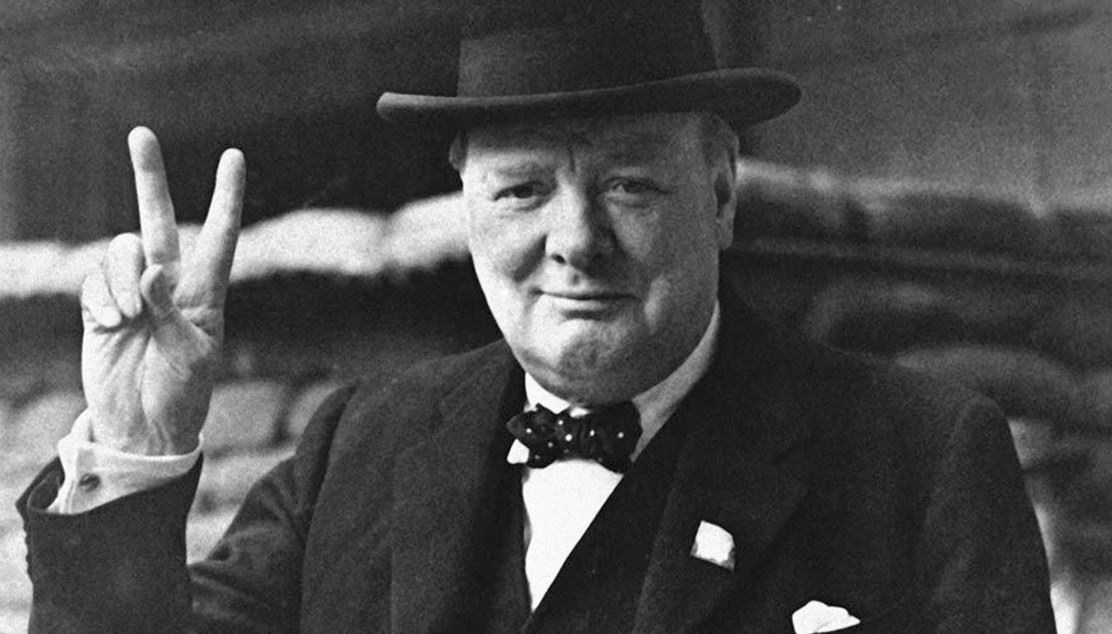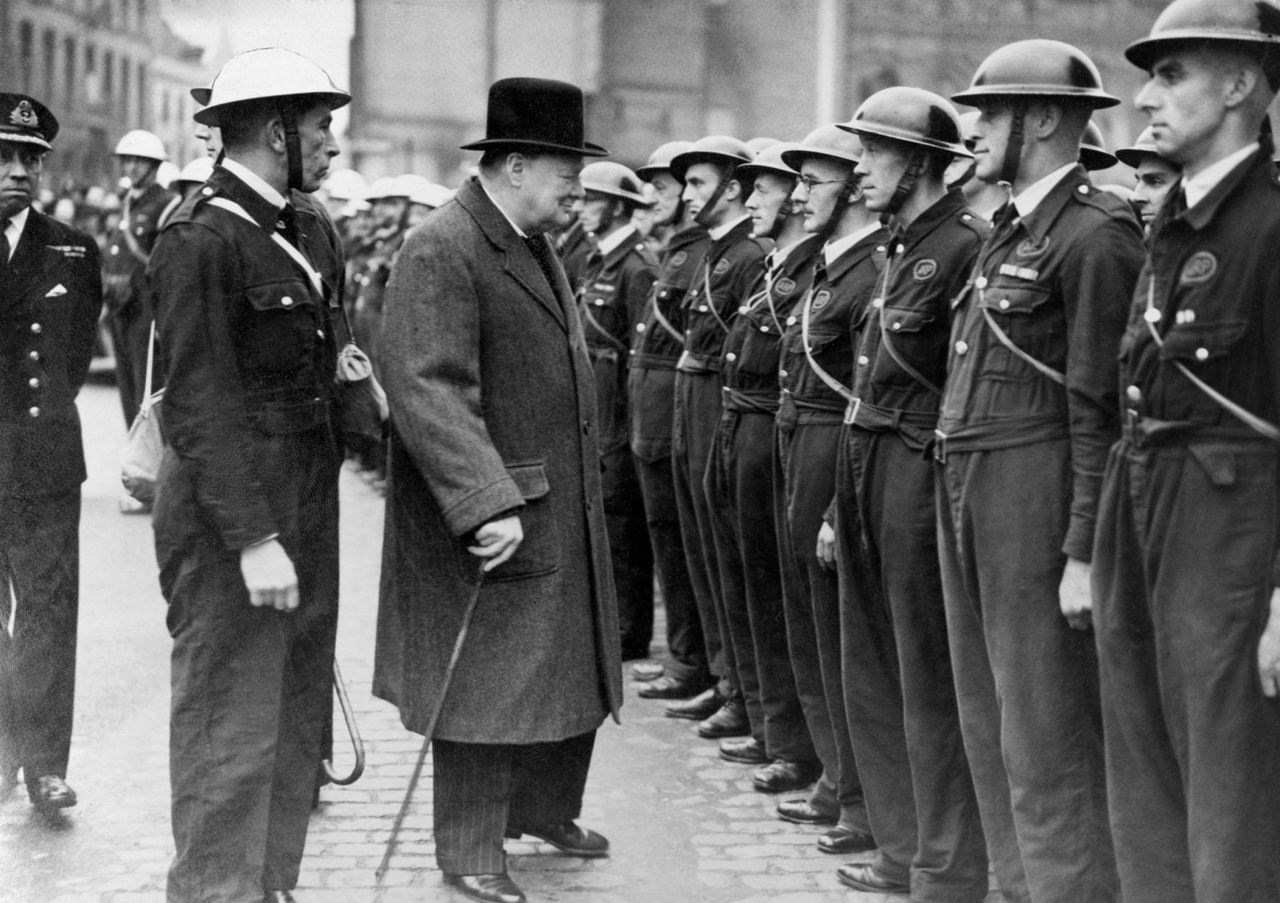 Winston Churchill showing his sign for victory.https://ww2podcast.com/ww2-podcast/churchill-britains-decision-to-fight-in-1940/
Winston Churchill showing his sign for victory.https://ww2podcast.com/ww2-podcast/churchill-britains-decision-to-fight-in-1940/
Society takes great pleasure in finding its heroes. There is a certain awe in finding characters who exemplify desirable traits such as strength, wisdom, and generosity on a larger scale. However, as enticing as it is to find such individuals, true heroes are rare occurrences who are born of the right situation and need. They are people who risk their lives to better the environment for those around them. One such individual who demonstrated this risk was Winston Churchill. Winston Churchill, born on November 30, 1874, was a British politician and writer. He served as both officeholder and soldier during World War I, and he was later voted as prime minister at the start of World War II. Under his leadership as prime minister, Britain was able to hold its ground against the Nazis until sufficient forces were gathered to ultimately subdue Germany. Winston Churchill found the courage to lead his country to fight against the Axis powers when all neighboring countries had fallen. A hero must have courage and leadership when faced with trials. They must also uphold the responsibility of protecting the well-being of others. Stepping up as the man of his time, Winston Churchill is a true hero for the determination he displayed throughout warfare and the commitment he had toward bettering his country’s future.
The determination Winston Churchill displayed during the time of Nazi aggression allowed Britain to stand firm and eventually achieve its victory. Before the visible threat of Hitler’s conquest, Winston Churchill knew that a war was brewing. The previous conflict of War World I, however, had left the majority of Parliament reluctant to enter another war. Churchill's advice seemed to fall on deaf ears: “[Parliament] perceived the danger of Hitler and his Nazis but chose to do nothing. The leaders of Britain at this time were not men of action” (Lace 69). While other the members of government were too frightened and unwilling to risk another bout of warfare, Winston Churchill knew that if Britain entered a state of passiveness, they might as well have surrendered themselves to the Nazis. His persistent warnings to Parliament gained him the title of “warmonger”, and he was often excluded from council meetings discussing Hitler’s regiment. However, Winston Churchill did not back down. He blew off the criticism and took it upon himself to assess the status of the naval fleet and military in preparation of what was to come. On September 1, 1939, Hitler invaded the country of Poland, a country that England had sworn to protect, and refused to withdraw his troops. With the Nazi invasion, Parliament could no longer ignore the threat. Scrambling to find a leader, the governing leaders turned to the one man who had anticipated these attacks: “Thus, at the age of sixty-five--an age when most people are looking forward to retirement-the somber yet determined statesman embarked on what would prove to be the most challenging journey of his life and in the history of his nation” (Gale). Winston Churchill wholly accepted the responsibility of prime minister without hesitation. He addressed the people of Britain and forewarned them that the next steps into the war would not be easy. Churchill did not yield once during Nazi aggression. The British endured many air raids and bombings the summer of 1940, but they held firm under the motto “never surrender”. Churchill waited out the many attacks until the fall of 1942, when the Americans were able to support the British troops and ultimately overpower the Germans. Winston Churchill showcased the heroic actions of resilience and determination during times of crisis. These characteristics make him not only deserving of his title as prime minister, but a hero as well.
 Churchill inspecting military troops.https://www.coventrytelegraph.net/news/coventry-news/gallery/winston-churchill-in-coventry-8508887
Churchill inspecting military troops.https://www.coventrytelegraph.net/news/coventry-news/gallery/winston-churchill-in-coventry-8508887
Winston Churchill was not solely focused on the triumph over Germany, he was also committed to the wellbeing and future of his country after the war. During the time of conflict, military, food distribution, and civilian safety were just a fraction of the logistics that needed to be managed. Yet, Winston Churchill managed to run them all:
"When he was not busy bolstering the spirits of his fellow Britons, Churchill--an impatient perfectionist with a seemingly inexhaustible supply of energy--was directing virtually every aspect of England's war effort. He personally ran the army, navy, and the air force and never hesitated to become involved in other areas that interested him, an unorthodox style of management that nevertheless had the full backing of the country" (Gale).
Winston Churchill was never one to be idle. He dedicated his attention to the efforts of World War II, and wasn’t exclusively focused on a single feature. When Winston Churchill saw that the medical care of his soldiers was not up to standard, he personally oversaw the tending of the wounded. Additionally, he strategized to ensure that the least amount of casualties would occur during combat. Success was important to Winston Churchill, but he never disregarded the details that provided safety and security for Britain. Even after the World Wars, he did not retreat into the comfortable life he earned: “[Churchill] remained active in politics, too, both on the national and international scenes. He was especially outspoken on the subject of the Soviet Union and constantly warned about the dangers associated with the spread of communism throughout Eastern Europe and beyond” (Gale). After Germany’s defeat, the influence of communism still expanded throughout eastern Europe. Winston Churchill worried that the communist influence would limit the Britons’ freedom and opportunity. He warned in a speech how “an iron curtain has descended across the Continent”, and that those who wished to keep their social freedom must be ready to take the steps in their own defense. Despite the disapproval he faced for his bold words, Churchill fought to keep his country’s welfare safe. Because Winston Churchill held his country’s prosperity as a number one priority, and his commitment to the issues at hand never faltered, he is a hero.
In the face of unrivaled adversities, Winston Churchill demonstrated the courage and commitment of a hero. Living in the 1900’s, the majority of Winston Churchill's life revolved around the World Wars. Instead of shying away from the increasing conflict between nations, Churchill decided to find a solution. He devoted his time and efforts into fighting against the Axis powers through his military and political experience. When no other leaders were willing to go to war, Winston Churchill went to war with the will to win. “...Churchill was an aristocrat, a brilliant dilettante, a creator in a dozen roles and garbs. He was a specialist in nothing--except courage, imagination, intelligence. He was never afraid to lead, and he knew that a leader must sometimes risk failure and disapproval rather than seek universal acclaim” (Gale). However, Winston Churchill was not perfect. He took losses both on the battlefield and in the government, making people criticize him for his failures. However, he did not give up when faced with opposition. His resilience in adversity is what allowed him to continue in his efforts to fight against Hitler and communism. This is one aspect of his life that is very inspirational. Whenever people face challenges, they often may be afraid of putting themselves to the test, not because they are afraid of failure but because of the feedback they will receive from failing. Winston Churchill has now taught many that failure at attempting an obstacle is better than not trying at all. Churchill lived a life full of risks and took each day as an opportunity to improve society. It was his hard fought life that allowed our current world to flourish as it does now. As much of a hero Winston Churchill was in 1945, he is even more of a hero today.
Works Cited
Lace, William W. The Importance of Winston Churchill. Lucent Books, 1995.
"Winston Churchill." Contemporary Heroes and Heroines, vol. 2, Gale,1992. Biography In Context, https://link.galegroup.com/apps/doc/K1607000055/BIC?u=powa9245&sid=BIC&xid=d8315b16. Accessed 26 Mar. 2018.
"Winston Churchill, Sir." Concise Dictionary of British Literary Biography, vol. 5, Gale, 1991. Biography In Context, https://link.galegroup.com/apps/doc/K1655000080/BIC?u=powa9245&sid=BIC&xid=3c95f851. Accessed 27 Mar. 2018.
Page created on 4/17/2018 4:12:26 PM
Last edited 4/19/2018 5:49:09 PM
